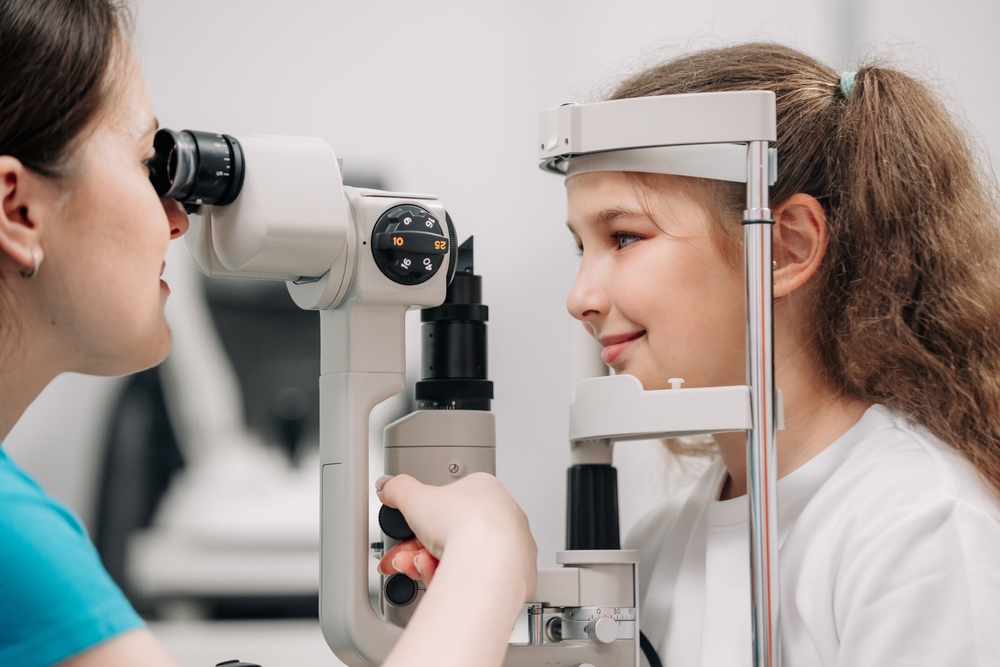
As a parent, you want to ensure your child is healthy, happy, and thriving—and that includes their vision. Early eye exams are crucial in detecting and addressing vision problems that may impact their development and school performance. So, when should you schedule that first eye exam for your child? Let’s dive into the recommended guidelines and the reasons why early eye care is so important.
Why Early Eye Exams Matter
Eye exams for children are more than just checking vision; they help assess overall eye health and identify issues that could affect learning, physical development, and self-confidence. Conditions like amblyopia (lazy eye), strabismus (crossed eyes), and refractive errors (like nearsightedness or farsightedness) are best caught early. With timely intervention, these conditions can often be managed or even corrected, setting your child up for a bright future both in and out of the classroom.
When Should Your Child Have Their First Eye Exam?
The American Optometric Association (AOA) recommends that children have their first comprehensive eye exam at six months of age. This may seem early, but the exam helps ensure that your baby's eyes are developing normally and that there are no early signs of vision issues. The eye exam at six months is brief and doesn’t require your baby to know letters or shapes; rather, it’s a specialized exam designed to assess eye health, alignment, and early vision development.
The Next Step: Preschool-Age Exam
Around three years old, your child should have another eye exam to evaluate how well they’re seeing and ensure their eyes are working together correctly. At this stage, their vision development is progressing rapidly, so catching any issues early can make a big difference. Preschool eye exams also help identify signs of eye conditions that could interfere with learning and social interactions as they start school.
Before They Start School
An eye exam before starting kindergarten or first grade is essential, around age five or six. This exam will assess visual acuity (how clearly they see), binocular vision (how well their eyes work together), and depth perception—skills necessary for reading, writing, and classroom activities. Even if your child hasn’t shown signs of vision problems, a thorough check-up can reveal issues that may not be obvious but could still impact learning and focus.
Signs Your Child May Need an Eye Exam Sooner
While these general age guidelines are useful, some children may benefit from earlier or more frequent eye exams. Here are a few signs to watch for that might indicate your child needs a check-up sooner than scheduled:
Frequent eye rubbing or blinking
Difficulty maintaining eye contact or focusing on objects
Squinting, tilting their head, or covering one eye
Complaints of headaches or eye discomfort
Difficulty tracking objects or recognizing familiar people
If you notice any of these signs, it’s a good idea to consult with an optometrist, as early intervention can make a big difference.
Ongoing Vision Care: Regular Exams for Growing Eyes
After your child’s first eye exam and their school-age check-up, they should continue to have eye exams every year. Children’s eyes change as they grow, so regular exams help ensure their prescription is up to date and that any new issues are caught early.
Setting Up Your Child’s First Eye Exam
At Designer Optical of Parkchester, we make sure your child’s first eye exam is a comfortable and positive experience. We use child-friendly equipment and a warm approach to help your child feel at ease. We’re committed to supporting your child’s vision and eye health every step of the way.
Start Your Child’s Vision Journey with Designer Optical of Parkchester Today
Early eye exams are a simple yet powerful way to give your child a strong foundation for a healthy life. By scheduling your child’s first eye exam, you’re helping them see the world clearly, build confidence, and reach their full potential.
Contact Designer Optical of Parkchester to schedule your child’s first eye exam and ensure they're set up for success in school and beyond. Visit our office in Bronx, New York, or call (347) 507-3166 to book an appointment today.






